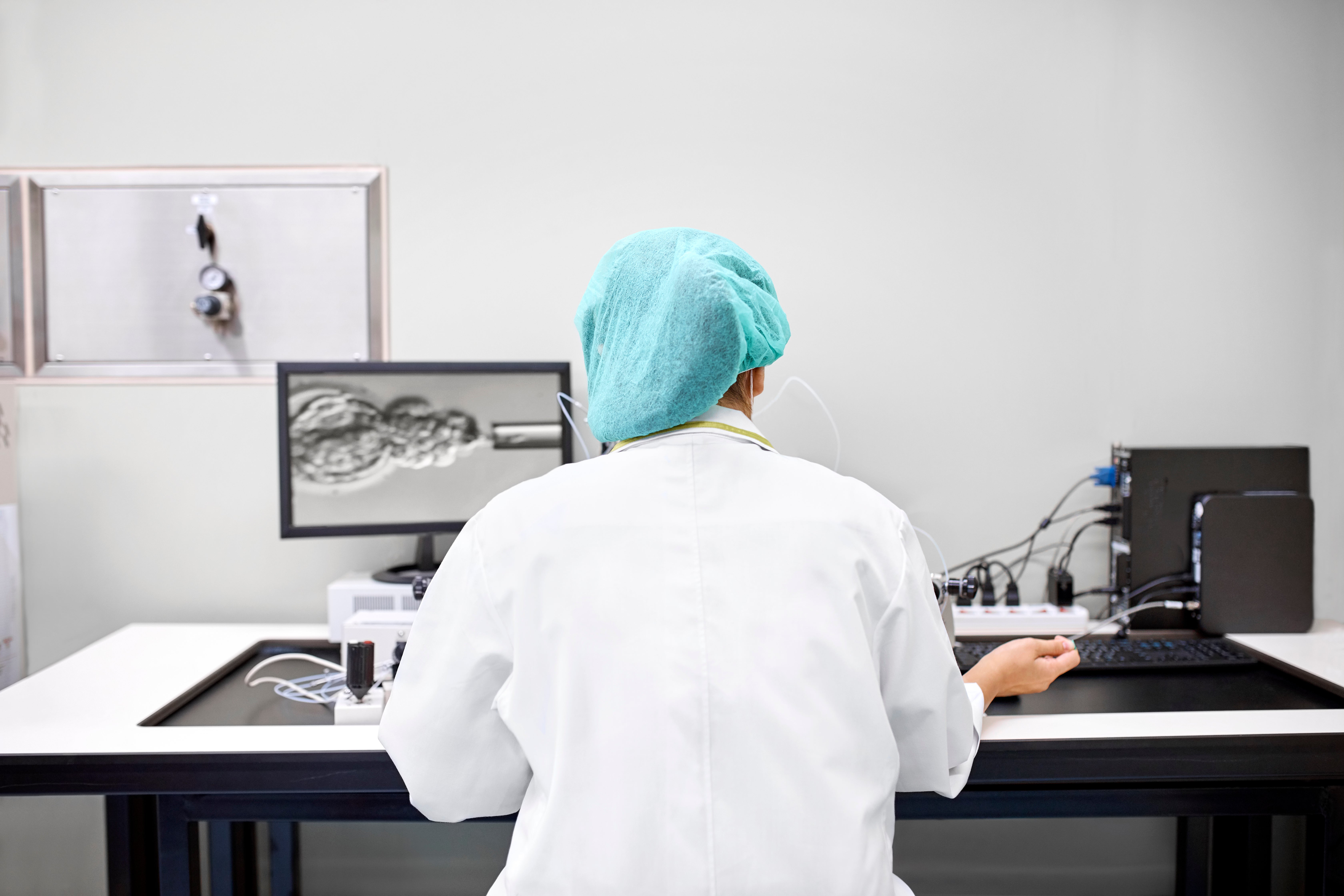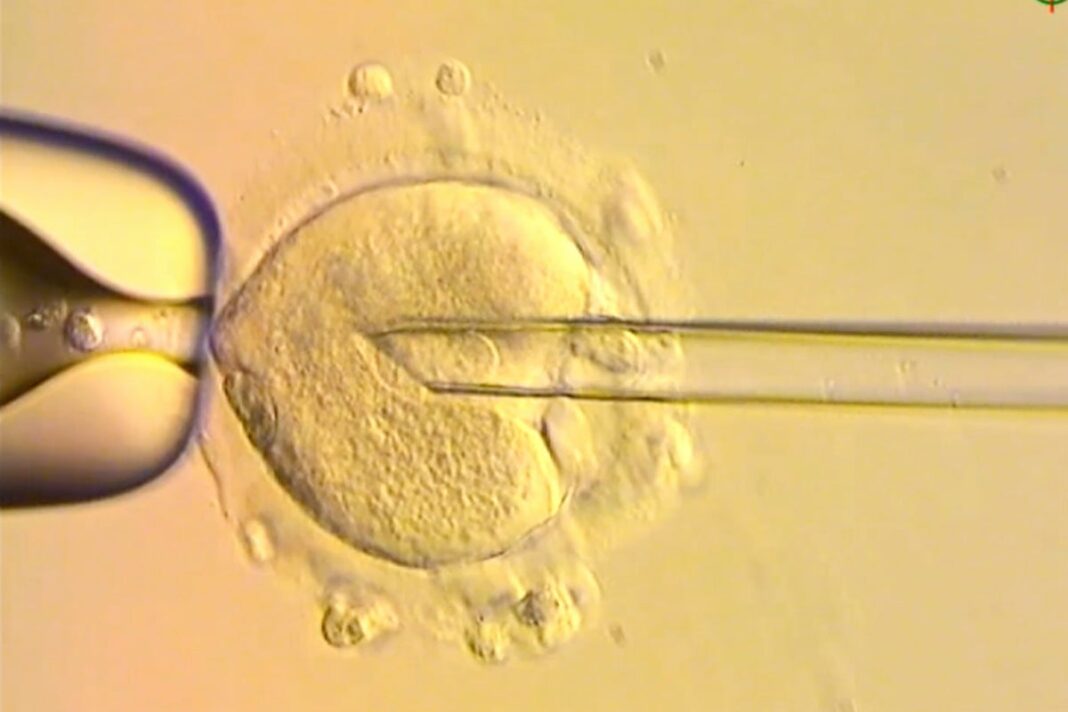A groundbreaking three-person IVF technique to prevent devastating disease has led to the birth of eight babies in the UK.
The scientific method, known as mitochondrial donation treatment, is designed to prevent children from being born with devastating mitochondrial diseases that are passed down from their mothers.
These illnesses can be fatal and often cause devastating damage to organ,s including the brain, muscle, liver, heart and kidney.
Four boys and four girls, including one set of identical twins, have been delivered and are all doing well, and one other woman is currently pregnant.
It follows treatment by a team in Newcastle, who pioneered the technique.
Of the eight babies born, three are now aged under six months, two are aged six to 12 months, one is 12 to 18 months old, one is aged 18 to 24 months and another child is aged over two.
All the babies are healthy and are meeting their milestones, according to the team from Newcastle upon Tyne Hospitals NHS Foundation Trust, Newcastle University and Newcastle Fertility Centre.
None of the eight babies shows signs of having mitochondrial DNA disease, which tends to affect around one in 5,000 births.
The scientists said disease-causing mitochondrial DNA mutations, picked up in three of the children, are either undetectable or present at levels that are very unlikely to cause disease.
The main lab method used by the team, known as pronuclear transfer (PNT), involves taking the egg from an affected mother, sperm from her partner and an egg from a donor who is free from disease.
The mother of a baby girl born through mitochondrial donation said: “As parents, all we ever wanted was to give our child a healthy start in life.
“Mitochondrial donation IVF made that possible. After years of uncertainty, this treatment gave us hope – and then it gave us our baby.
“We look at them now, full of life and possibility, and we’re overwhelmed with gratitude. Science gave us a chance.”
The mother of a baby boy added: “We are now proud parents to a healthy baby, a true mitochondrial replacement success. This breakthrough has lifted the heavy cloud of fear that once loomed over us.
“Thanks to this incredible advancement and the support we received, our little family is complete.
“The emotional burden of mitochondrial disease has been lifted, and in its place is hope, joy, and deep gratitude.”
Professor Sir Doug Turnbull, from Newcastle University and part of the team of researchers, said: “Mitochondrial disease can have a devastating impact on families.
“Today’s news offers fresh hope to many more women at risk of passing on this condition who now have the chance to have children growing up without this terrible disease.”
In all the cases, the Newcastle team used the PNT technique after the egg was fertilised.
For this, scientists transplanted the nuclear genome (which contains all the genes essential for a person’s characteristics, such as hair colour and height) from the egg carrying the mitochondrial DNA mutation into an egg donated by an unaffected woman that had had its nuclear genome removed.
Thanks to the procedure, the resulting baby inherits its parents’ nuclear DNA, but the mitochondrial DNA is mainly inherited from the donated egg.

Scientific progress in this area led parliament to change the law in 2015 to permit mitochondrial donation treatment.
Two years later, the Newcastle clinic became the first and only national centre licensed to perform it, with the first cases approved in 2018.
Approval is given on a case-by-case basis by the UK’s Human Fertilisation and Embryology Authority (Hfea).
The new findings on the eight births, published in the New England Journal of Medicine, show that all the babies are developing normally.
Aged 18 months, tests are carried out in areas such as gross motor skills, fine motor skills, cognitive and social development and language skills to check the babies are hitting milestones.
The researchers will also check the children when they are five.
Professor Bobby McFarland, director of the NHS Highly Specialised Service for Rare Mitochondrial Disorders, said he was confident the children would carry on developing normally.
He added: “If we’re not picking up subtle signs of problems at five, then we’re really very clear that is not going to be a problem.”
He added: “In my work… I see children in intensive care units up and down this country and that’s not pleasant.
“It’s very difficult for families to deal with these diseases, they are devastating…
“To see babies born at the end of this is just amazing, really.”
Mary Herbert, professor of reproductive biology at Newcastle University, added: “PNT happens in the small hours of the morning – those long nights. And it has paid off.
“It’s fair to say it’s rewarding. In science though, periods of joy are fleeting and brief because you’re always thinking, what is the next challenge? How do we optimise it further?”
She said the slight DNA mutations seen in three of the children are “way, way below the threshold that would cause disease”.
Peter Thompson, chief executive of the Hfea, said: “Ten years ago, the UK was the first country in the world to licence mitochondrial donation treatment to avoid passing the condition to children.
“For the first time, families with severe inherited mitochondrial illness have the possibility of a healthy child.
“Although it’s still early days, it is wonderful news that mitochondrial donation treatment has led to eight babies being born.
“Only people who are at a very high risk of passing a serious mitochondrial disease onto their children are eligible for this treatment in the UK, and every application for mitochondrial donation treatment is individually assessed in accordance with the law.”
Dr Andy Greenfield, from the University of Oxford, said: “It is a triumph of scientific innovation in the IVF clinic – a world first that shows that the UK is an excellent environment in which to push boundaries in IVF; a tour de force by the embryologists who painstakingly developed and optimised the micromanipulation methods; an example of the value of clinical expertise, developed over decades of working with children and adults suffering from these devastating diseases, being used to support a new intervention and subsequent follow-up, potentially for many years.”
Beth Thompson, executive director for policy and partnerships at Wellcome, said: “This is a remarkable scientific achievement, which has been years in the making.
“The pioneering work behind mitochondrial donation is a powerful example of how discovery research can change lives.”
Professor Dagan Wells, from the University of Oxford, said the study showed established methods for avoiding mitochondrial DNA diseases, such as preimplantation genetic testing, perform well and will be suitable for most women at risk of having an affected child.
“A minority of patients are unable to produce any embryos free of mitochondrial disease, and for those women the study provides hope that they may be able to have healthy children in the future,” he added.



